Thomas Barns
A life of adventure and service
Born in 1919, Dr Barns graduated from Oxford University, England as a medical doctor in 1944. He was immediately drafted into the British Army during the second World War. He married while waiting for his posting, but three days into the honeymoon, he received his embarkation orders.
He was stationed in India where he served as an anesthetist in a frontline mobile surgical unit. He returned to Oxford three years later to specialize in obstetrics and gynecology, gaining experience while researching his PhD in pelvic tuberculosis, which won him the Blair Bell Memorial Lecture at the Royal College of Obstetricians and Gynaecologists in London.
In 1952 he was appointed as State obstetrician and gynecologist for Johore, Malaysia, and as a personal physician to the Sultan. There, he developed the Flying Squad Service to deliver emergency obstetrics services to remote locations regardless of communist insurgency.
Dr Barns' life was not without risks. During his time in Malaysia, he worked in the red zone and drove his specially designed jeep, with medical supplies and operating space on board, to provide emergency care wherever it was needed.
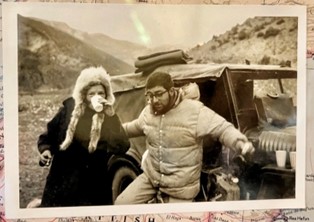
Dr Barns in 1969, during travel from India to the United Kingdom, with the special jeep that he built from scratch.
Credit: WHO
Serving the most vulnerable at WHO
Dr Barns worked for the WHO Regional Office of South-East Asia (SEARO) in Delhi, India from 1971 to 1978, and with the WHO Country Office in Sri Lanka. He also worked in Vellore, India, training nurses in Hindi. Notably, he had the memorable opportunity of meeting and working with Mother Teresa in Delhi.
His career took him around the world, to war zones and remote villages, where he developed emergency and outreach systems that are still used today.
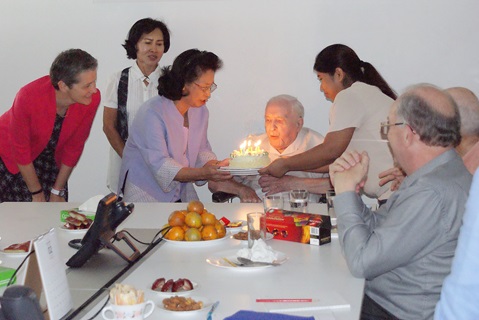
Dr Barns celebrating his 100th birthday with colleagues at the WHO Office in Thailand, in 2019.
Credit: WHO
Sadly, Dr Barns passed in September 2023. He was living in Thailand at the time and was 104 years old.
Gwendoline Carnelley
Beginnings at headquarters in Geneva
A British national, Ms Carnelley began her career at WHO in 1949, one year after the Organization was founded. She worked in the Office of Conference and General Services and then in the Office of the Director-General.
A global career spanning decades
Ms Carnelley worked for two years from 1956 on a WHO/UNDP project in Sri Lanka before returning to headquarters to work for an Assistant Director-General. Two years later, she was on the move again to spend three years on an Inter-Regional Project in Iran and then a year on an Inter-Regional Project in Ghana.
She returned to headquarters in 1972 and spent three years in the Division of Environmental Sanitation before returning to Iran in 1975. In 1976, she moved to the Regional Office in Manila, spending two years in the Health Services section and two years in the office of the Regional Director. She took early retirement in 1980.
In 2023, during the World Health Assembly and in celebration of the 75th anniversary of WHO, Ms Carnelley was introduced by Director-General, Tedros Adhanom Ghebreyesus, and addressed the delegates during the closing ceremony.
“It was my great honour to work at the World Health Organization for over 30 years in Switzerland, Sri Lanka, Iran, Ghana and the Philippines,” she said. “It was my first job and my most cherished. It made me so proud to work for the health of people all over the world. And I know that WHO is still as important today as it was when I worked there, and maybe even more so.”
“I would like to thank all the Member States and all the health partners, and my dear past and present WHO colleagues for all you do to help make the world healthy and safe. You are my family and you make me proud to be WHO.”
Kevin Cook
Originally a British national, Kevin worked at WHO headquarters as an English Editor-Translator in the Department for Health Legislation from 1975-1983.
He was responsible for translating legislative texts from numerous European languages and editing English texts in a bilingual unit that published the International Digest of Health Legislation/Recueil International de Législation Sanitaire four times a year.
Using language skills for the benefit of public health
Looking back, he is particularly proud that he was able to use his multilingual skills for the benefit of a non-commercial organization, working for one of the best causes in the world – international health care.
Today Kevin lives in the Netherlands and has taken Dutch nationality. He is a member of the International Association of Hyperpolyglots and speaks 16 languages fluently with a reading knowledge of another 12.
He remembers his eight years in Geneva as an unexpectedly pleasant and satisfactory period of his life. After working only two years in the United Kingdom, he found himself in an international environment among people from all over the world, doing a job that enabled him to improve his already advanced multilingual skills. He was also able to learn to ski in his free time.
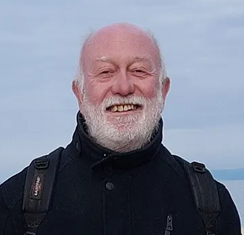
Kevin Cook
Credit: WHO
Said Kevin: “I enjoyed the most comfortable period of my life, and felt I was doing something truly useful for humanity. I’m still in contact with a dozen or so friends I made during my time in Geneva, most of whom now live elsewhere. But our Geneva experience is a common thread in our lives."
Pascal Diethelm
A staff member from 1970 until 2002, Pascal Diethelm’s entire career took place at WHO headquarters in Geneva. His career spanned the terms of office of five WHO Directors-General: Drs Candau, Mahler, Nakajima, and Brundtland. The fifth, Dr J.W. Lee, was a good friend; his mandate unfortunately ended tragically with his abrupt death in 2006.
A varied career spanning several decades
Pascal started his career as a “programmer analyst” in the Division of Research in Epidemiology and Communication Science. He then led the EDP team supporting HRP (Human Reproduction Programme) and was responsible for the computational aspects of the many multi-centered clinical trials undertaken by HRP on various contraceptive methods (notably providing support to China). He then went on to work as a systems analyst in Information System Management, ending his career at WHO as Chief, Information Technology Services.
Pascal describes his time at WHO as full of fascinating events and activities. He says: “It is difficult to choose one as the highlight of my career. Dr Paddy Rowe's obituary in the October 2022 issue of the AFSM Quarterly News recalled that his work in assessing the safety and effectiveness of different IUDs helped China switch to the safer and more effective copper devices in 1993, averting some 55 million unintended pregnancies in ten years. More than 160 million IUD users around the world today owe their access to safe, affordable and effective contraception to Paddy's leadership. I am quite proud to have been associated, in a small way, with his work by contributing to the computing part and by co-authoring some of the seminal papers that he wrote.”
Pascal’s message to current and future staff: “Your mission, whatever your role as WHO staff member, is critical for the future of humanity. Only healthy populations – using the definition of health given in the WHO Constitution – will be able to tackle the huge challenges of today, such as climate change, biodiversity degradation, social and developmental inequalities, and governance deficiencies. Health is an absolute prerequisite. Keep this in mind all the time.”
Chris Dye
Chris Dye, a scientist specializing in tuberculosis epidemiology, who later expanded to HIV/AIDS and malaria, came to WHO headquarters in 1996 on a one-year sabbatical from his university post at the London School of Hygiene and Tropical Medicine in the United Kingdom. He stayed for 22 years!
His last post at WHO was as Director of Strategy, Policy and Information in the Office of the Director-General, Dr Margaret Chan.
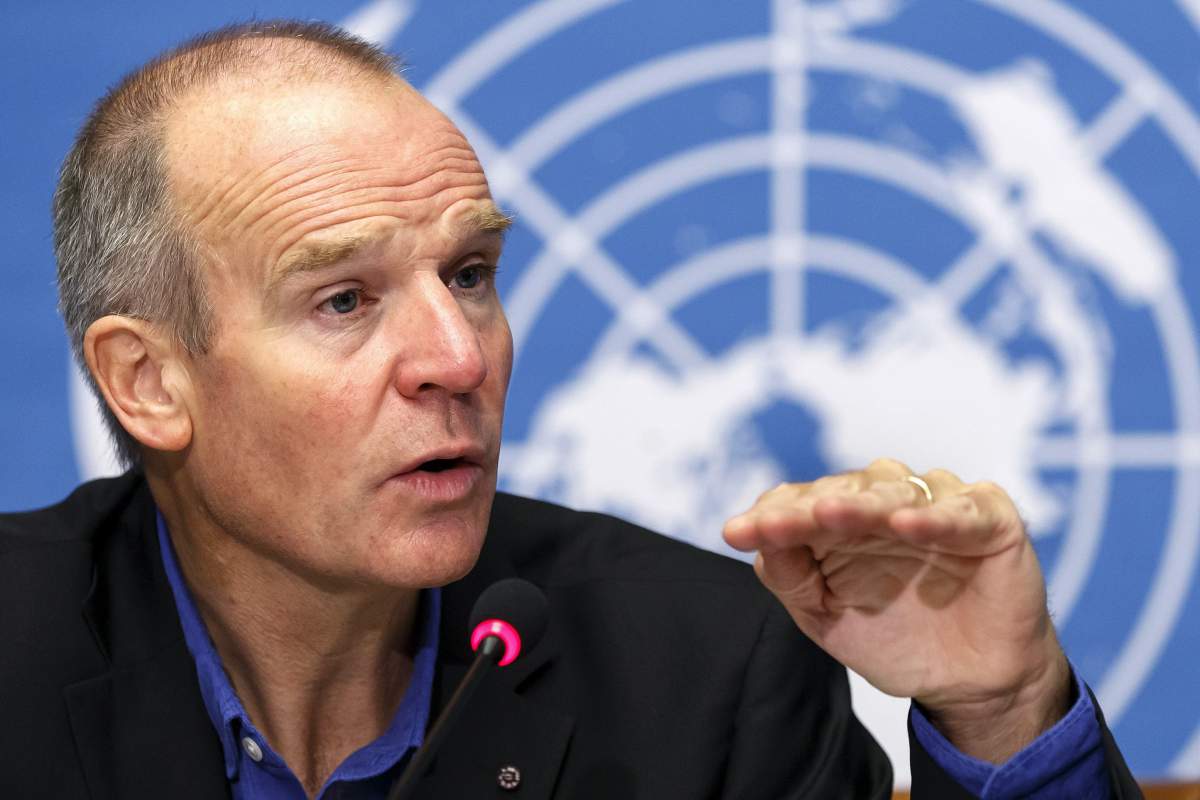
Dr Chris Dye speaking at a UN press conference
Credit: WHO
Asked about the reasons for his extended stay, Chris gave three: he was overwhelmed and excited by the access to vast quantities of information that can be used to understand the epidemiology and control of infectious and other diseases; the epidemiology can be directly translated into public health action; and with, with young children, the quality of life was far better than in central London!
Career highlights
Upon reflection, Chris considers that the discoveries made on TB epidemiology were among his career highlights, especially the way TB and drug-resistant TB could be controlled by sound public health interventions (even without new drugs) and how the control of two major epidemics ‒ TB and HIV/AIDS ‒ can work synergistically.
“The analysis, mixing theory and practice, was made possible by a global network of WHO collaborators, including national TB programme managers, who provided data and insights for our worldwide surveillance reports. Launched by Mario Raviglione in 1997, we developed and expanded these reports over the following decade. Our approach was adopted by the Global Malaria Programme and influenced similar WHO reports on tobacco and disabilities,” he said.
Underlining the role of science in public health
Chris considers that his greatest contribution to WHO was being able to underline the role of science in public health: “In the early days of the Global TB Programme, we had to work hard to persuade directors that WHO policy needed a robust and transparent scientific base, presented not just in WHO technical reports but also in respected, peer-reviewed science and medical journals. As a last act (more or less), I tried to persuade Margaret Chan that WHO needed a Chief Scientist. I would like to think that our discussions played a tiny part in creating that position, first occupied by Soumya Swaminathan, WHO’s first Chief Scientist (2019–2022).” The post is now occupied by Jeremy Farrar.
Chris’s advice to younger staff members on their career path? “While fighting all those day-to-day battles, hold on to WHO’s bigger vision: to promote health, keep the world safe and serve the vulnerable. It’s needed now more than ever.”
Rui Gama Vaz
Rui Gama Vaz retired from WHO in 2019, after a WHO career spanning 20 years. He worked as WHO Representative in three countries, as well as Regional Adviser in critical programmes in the African region such as HIV/AIDS and polio. His last post was as Coordinator of the Country Cooperation Unit at headquarters in Geneva.
Rui Gama Vaz began as the EPI/Polio Team Leader in Angola during the large polio epidemic 1999, after being recruited from UNAIDS. After polio transmission interruption in 2002, he worked as WHO Liaison Officer in the Seychelles, Regional Adviser for HIV/AIDS at the Regional Office for Africa (AFRO), Head of the WHO Country Office in Angola, Polio programme coordinator at AFRO and Head of the WHO Country Office in Nigeria.
Rui Gama Vaz is particularly proud of being able to enhance country public health infrastructure by using the investment made for EPI and polio. The investment in these programmes has subsequently been used to address other public health challenges, such as cholera, measles, meningitis, Lassa fever, ebola and COVID-19.
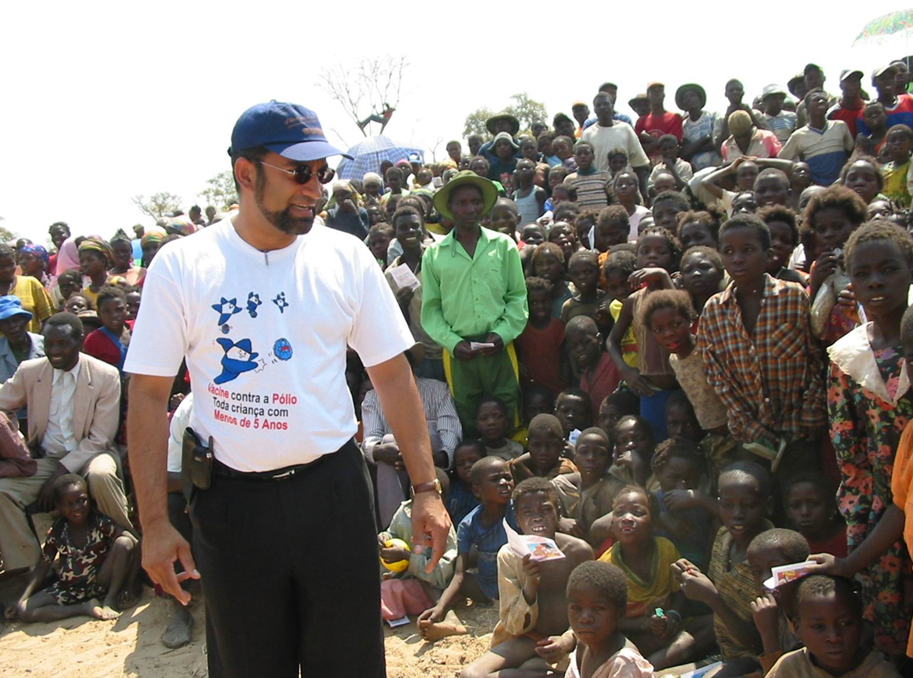
Rui Gama Vaz during the polio eradication campaign in Angola.
Credit: WHO
Rui’s advice to current and future WHO staff? “Try always to do your best wherever you go, because one day, you may have to return! To those who are or will assume in the near future, any leadership role in the Organization, do not forget that leadership is not given. You must earn it! You will only be recognized and respected as leader if you can show results; respect your team and always be ready to provide necessary support to them when needed.”
Saroj Jha
Dr Saroj Jha started her career as a doctor, then as a professor at a medical college. Her passion for education led her to WHO, which gave her an opportunity to be a health educator at community level.
Making Health for All a reality
Dr Jha joined the Regional Office for South-East Asia (SEARO) in New Delhi in the early 1980s, focusing her work on health education and communications. She and her team were committed to the whole-of-patient care approach to community medicine, and started the concept of medical social workers working together with doctors to help bring primary health-care services to the community.
Dr Jha was also a Team Lead for Community Health, where she had the opportunity to design and develop technical reports and deliver trainings for communities in countries in South-East Asia. She worked closely with communities and regularly went in the field to engage with families, women, children, nurse trainers, medical school teachers and health-care practitioners. “I interacted with policy-makers, diplomats, ministers of health and WHO leadership. And I interacted with people living in villages – nursemaids, garbage recyclers, and technical experts. The depth and breadth of experiences I have had with WHO are too innumerable to be listed. The sense of purpose and achievement I had while going out into the community and engaging with family units, learning to see the full picture of an individual's health and the health of their cultural, familial and religious norms really helped me appreciate WHO's push towards Health for All.” 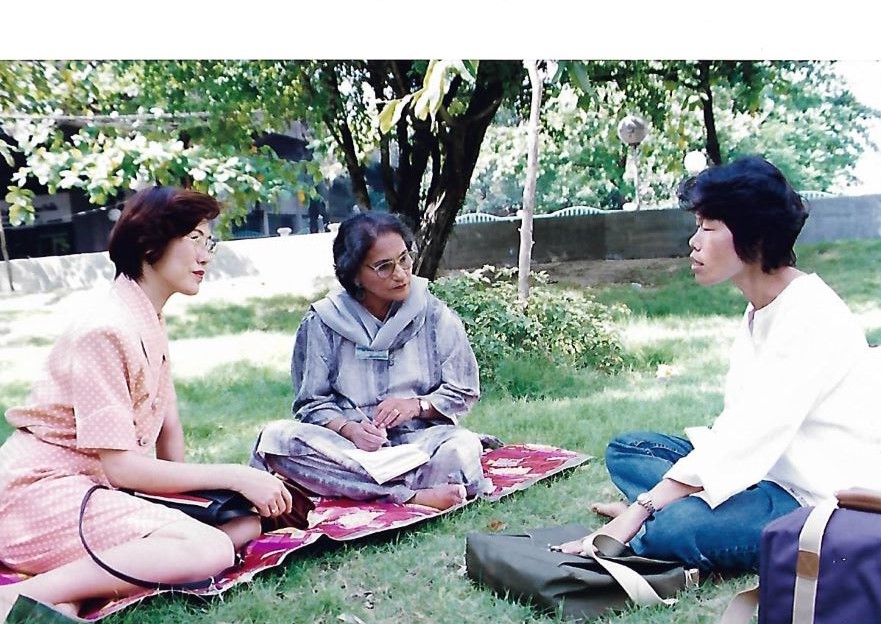 Dr Saroj Jha talking with community members about a project for street children in Bangkok, 1998
Dr Saroj Jha talking with community members about a project for street children in Bangkok, 1998
Credit: WHO
So much progress already made
“We all truly understood what was needed to bring Health to All to the people – this idea of complete physical, mental and social well-being permeated all our work,” continued Dr Jha. While in the field, she says that “vaccine unfamiliarity and hesitancy was something we needed to address on a daily basis. There is still lots of work to accomplish this admirable goal of Health for All, but we must not forget what a long way we have already come and how many successes, big and small, we have accomplished – smallpox eradication; tobacco control; our ongoing efforts towards polio eradication; understanding and mitigating risks of water-borne diseases through use of oral rehydration solution; our AIDS programmes; maternal and child health; and our focus on health and nutrition.”
Looking back at her time with WHO, Dr Jha says: “My most cherished memory has been the introduction of community medicine and Health for All as our target. My passion for health education has stuck with me past my WHO work life – and I have been able to continue being of service to our communities.”
Sumedha Mona Khanna
Dr Sumedha Mona Khanna began her career at the Pan American Health Organization (PAHO) in 1968, as an advisor in maternal health and population dynamics in Trinidad and Tobago, where she served for two years.
WHO’s first female Country Representative
In 1970, Dr Khanna became the first woman to lead a Country Office. “Perhaps one of the most important highlights of my career in WHO was to be the first woman appointed as a WHO country representative in Guyana,” she said. “This gave me an opportunity to coordinate PAHO’s technical assistance in a variety of programmes in the country, including a new initiative for training a new type of rural health worker for Guyana. I believe I opened the possibility for women to be included in professional positions at all levels, including as regional directors and the Director-General. This was a major breakthrough for women in WHO.”
Important contributions in family planning and maternal health
Her next assignment was as Head of Planning and Evaluation in the Health and Population Dynamics Division in PAHO in Washington D.C. From 1977 to 1980, she worked as PAHO/WHO Country Representative in the Jamaica Office that also covered the Bahamas, Belize, Bermuda, Cayman Islands and Turks and Caicos Islands.
One of her major contributions in the region was to introduce family planning within the Maternal and Child Health programmes in the Latin American countries. This was a new initiative as new contraceptive methods had been developed that required special training of health-care workers. “I was the first technical advisor in the field for helping countries introduce family planning services in their maternal health programmes,” recalled Dr Khanna. “New contraceptive methods had been developed in the 1960s, and the Caribbean countries were among the first to provide them as part of their maternal health initiatives.”
In 1980, Dr Khanna served as Chief of the Division of Comprehensive Health Services in PAHO HQ. Her next assignment, starting in 1983, was at WHO headquarters in Geneva, in the Health-For-All Strategy Coordination Unit, first as its Deputy Director and then its Director.
In 1988, Dr Khanna moved to Indonesia as WHO Country Representative, with a special assignment as liaison to the Health Desk of the Non-Aligned Countries. “My assignments in the country, regional and headquarters offices were unique and gave me a good understanding of how WHO works and interacts at all levels,” she said.
Leadership development in public health
Dr Khanna also considers the Health for All Leadership Development Initiative one of her major contributions to WHO. As the Director of the Health for All Strategy Coordination Office, she felt that policy-makers and government officials needed to understand the actions they should take in order to implement the Health for All strategy in their country. During 1985-1988, leadership development programmes were implemented at both global and regional levels. In 1988, WHO technical discussions on Health for All leadership development were held, and resulted in a unique declaration on Leadership for Health-For-All, approved by the World Health Assembly.
“Leadership Development in Health was a unique initiative for policy and managerial levels of health and social sectors in the world,” said Dr Khanna. “We created this programme from scratch and developed the content as well as the methods of its implementation at all levels of the health sector. At that time no such programmes existed. I believe it made an important impact on health development and educational institutions.”
Ongoing public health advocacy
While she retired in 1993, Dr Khanna continues her advocacy for public health. In 2020, she was invited by the Government of Guyana to participate in the 50th Anniversary of its National Health Development. “It is a privilege to have the opportunity to serve in WHO. As WHO technical experts you have the privilege to transfer the technical knowledge and expertise to local health officials,” she said.
To the WHO workforce, she stresses that “it is important that you offer technical excellence in the field of health you are assigned. Health care technology and approaches are advancing rapidly now. That means continuing to upgrade your own knowledge and expertise. Your task is to create and transfer this expertise at country level and at the institutions you are assigned.”
